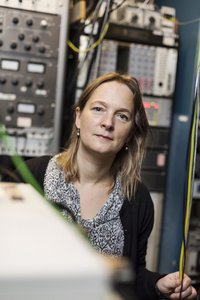ERC Starting Grant Enabled Me to Build My Research Group
Professor Liv Hornekær had a well-defined research idea and a strong desire to build her own research group within experimental physics. Therefore, she applied for an ERC Starting Grant while she was an associate professor. And she got it. “It takes an excellent idea and a lot of work to prepare a proposal. But then again, you also get the opportunity to develop your research, so whether you receive the grant or not, the time is still well-spent”, the professor says. Since then she has also received and ERC Consolidator Grant.

A Boost to Your Research Career
At the beginning of her research career, Liv Hornekær sought out all opportunities, and the ERC Grant was a logic and obvious possibility. Liv Hornekær considered the ERC to be a really good opportunity for her to acquire money for building her own research group and her own lab at a relatively early point in her career. When you propose a project like mine, you really also sharpen your own field of research. What is the most wild project, you can apply for? It is actually a quite useful process during which you try to find out what you really want to do for many years to come.It is a matter of designing a significant project that allows you to apply for funding meant for young researchers. And you should not be deterred by the ERC. The chance of success is more or less the same as with the other funding agencies that are available for young researchers”, the professor says.
What Is Your Wildest Research Idea?
When you apply to the ERC, you need to think high-risk/high-gain. You must have the courage to suggest something that you are really not sure will be possible. “We also included high-risk methodology development that had the potential to produce exciting results. We pushed the idea a little bit further than you would do in an ordinary project in order to make it more exciting to address the idea”, Liv Hornekær elaborates.
Integrate Knowledge into New Contexts
Liv Hornekær has been successful with more than just her ERC proposals. She has also received a Marie Curie ETN grant, a grant from the Innovation Fund Denmark, a grant from the Independent Research Fund Denmark and many more. Liv Hornekær believes that a good part of her proposals have been successful because she understands how to use the knowledge obtained from one research project to address new problems in other fields of research. And when you apply your expertise to new contexts, you need to involve other competences and professional expertise. In her experience, that approach fits well with the funders’ interests. “Curiosity and an experimental approach come natural to me. However, I believe that the majority of researchers will be able to apply their scientific insights or methods to new fields. Many funders want the applicants to move into new areas or new problems, but they want the researchers to do so on the basis of a solid and relevant research platform”, she points out.
Proposal Strategy
Liv Hornekær continuously considers where and what her research group needs to apply for. In this way she ensures the growth of her group and consequently of the research field. Besides, you need quite a lot of money to acquire and maintain the equipment that experimental physics requires.
She makes sure that she has the comprehensive view of foundations and deadlines. She also believes that you need to allocate enough time for proposal writing and to make use of feedback: “Those you ask for feedback need to be critical and candid. It is nice to be praised, but most often criticism is the most valuable feedback for proposal writers. Then you can just sort out the non-useful points yourself. Last but not least, you need to finish well in advance of the deadline, so that you have the time to fine-tune your proposal. There is no room for mistakes or anything that disrupts the evaluators’ smooth reading, if you want your proposal to succeed and bring you money”.
Good advice
Liv Hornekær advises young researchers “to establish an independent research profile and to aim for something that you find exciting or important. The people evaluating your proposal will be more inclined to grant you money if your proposal is slightly different from the majority of proposals. You need to create a platform and to produce research that stands out from the crowd. If you offer something unique, more people will be interested in collaborating with you”.
For more information about ERC please contact the Research Support Office.